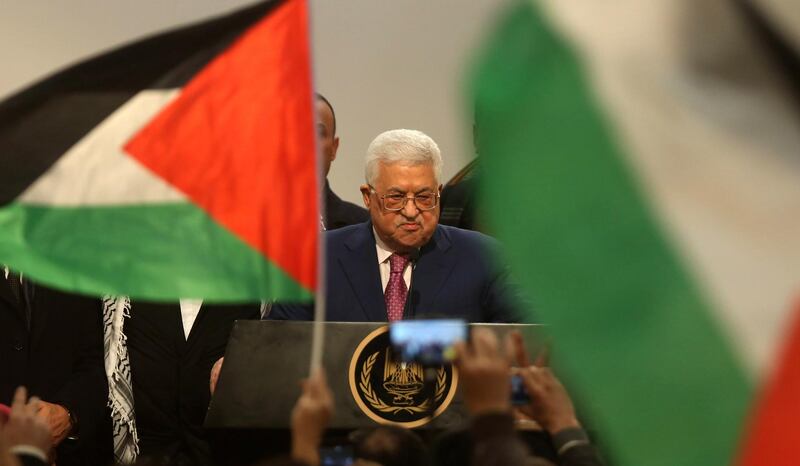Palestinian President Mahmoud Abbas has warned that the future of the Israeli-Palestinian conflict is “dangerous” as the United States continues to take unilateral moves that threaten a new outbreak of violence in the region.
The Palestinian leader spoke late on Friday from Cairo where he arrived on a three-day visit to meet with Egyptian President Abdel Fattah El Sisi about reconciliation efforts between his Fatah party and Hamas, the rulers of Gaza.
He reiterated his threat to suspend all agreements with Israel, including security coordination between Palestinian and Israeli security forces. He said he would not be pressured into conceding historic Palestinian positions by the US or Israel.
“The future is dangerous,” he said. “I have no more strength to fight, but I will not end my life as a traitor, I can say ‘no,’ and the Palestinian people beside me also say ‘no’.”
He is meeting Mr Sisi in Egypt, where he is set to attend the opening of the country’s largest mosque, as Cairo tries to mediate between Israel, Hamas and Mr Abbas’ Palestinian Authority to end Palestinian divisions and prevent a new outbreak of conflict in Gaza. The last time the two met was in November at the Egyptian resort of Sharm El Sheikh.
“We are dealing with three issues that we can not accept: the situation with the US, the situation with Israel and the situation with Hamas,” Mr Abbas told reporters.
He said that any cooperation or dialogue with the US was still off limits after President Donald Trump moved the American embassy from Tel Aviv to Jerusalem last year.
“The doors are closed to the US,” he continued. “As long as it does not retract its decisions against the Palestinian people, no Palestinian should meet with the American leadership, no matter what their role is.”
_______________
Read more:
[ Israel’s new mayor of Jerusalem is planning to silence mosque loudspeakers ]
[ Palestine denies receiving specifics of US peace plan ]
_______________
As well as the embassy move, Mr Trump has cut all US funding to the United Nations refugee agency and slashed funding for hospitals in East Jerusalem that serve sick Palestinians.
His trip comes at a time when Fatah and Hamas are bitterly divided. Fatah officials say that Hamas prevented their members in the enclave from commemorating the 54th anniversary of the party’s founding.
Hamas has been angered by Mr Abbas’ cuts to fuel and salaries in the besieged strip, seeing his moves as a betrayal of the Palestinian cause. The Palestinian leader is concerned that he could be usurped by the group, who retain more popular support than his party as they are perceived to be more active in attaining greater Palestinians.
Mr Abbas remains deeply unpopular to Palestinians in the West Bank, with almost two-thirds of them wanting him to resign. They are aggrieved over his failure to deliver progress in the moribund peace process, his cooperation with Israel and perceived corruption among his inner circle.
On Friday, the Gaza offices of President Mahmoud Abbas's official Palestine Television station were attacked and ransacked, adding to tensions between the two parties.
Rafat Al-Qidra, the office director, said five men broke into the premises early on Friday and destroyed cameras, editing and broadcast equipment worth nearly $150,000.
The station broadcasts material supportive of Mr Abbas's Western-backed Authority, whose power base lies in the West Bank. Station officials immediately blamed Hamas for the attack.
"Hamas is deeply involved in this conspiracy," said Ahmed Assaf, chairman of the Palestinian Broadcast Corporation (PBC), speaking to the channel in the West Bank city of Ramallah.
There has long been antipathy between Hamas, which won the last Palestinian parliamentary elections in 2006 and is opposed to any peace negotiations with Israel, and with Mr Abbas's more moderate and secular Fatah faction.
The two rivals have failed to end the divisions since 2007. Egypt has brokered a Palestinian reconciliation pact that provides for Hamas to cede control of Gaza to Mr Abbas, but a dispute over power-sharing has hindered implementation of the deal.
In March last year, a bomb exploded next to the delegation of Palestinian Authority Prime Minister Rami Hamdallah. Officials in Ramallah blamed Hamas for the blast but the Gazan rulers denied any involvement. Senior Palestinian officials from the West Bank have stopped going to the enclave because of security concerns.






